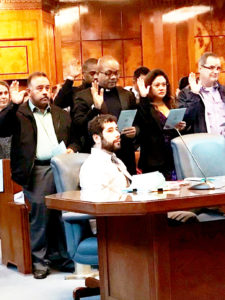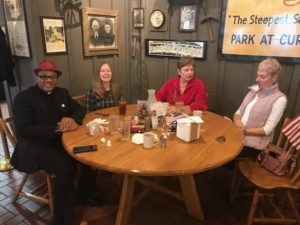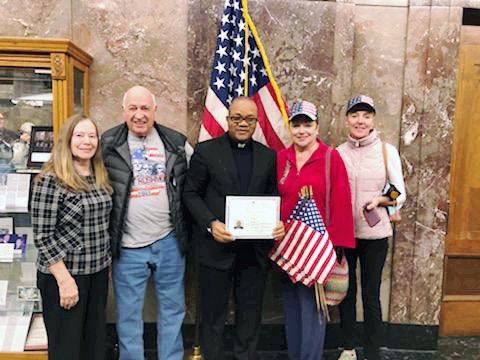Pastor of St. Joseph the Worker sworn in as U.S. citizen during Dec. 6 naturalization ceremony in Chattanooga
By Bill Brewer
Pardon Father Julius Abuh while he brushes up on his Southern drawl.
Since becoming a U.S. citizen Dec. 6, the pastor of St. Joseph the Worker Parish in Madisonville feels an obligation to connect more closely with his adopted community. Home is now very far away from home.
So parishioners may notice a little East Tennessee twang in his homilies as he blends accents.
“Sharing this good news with my parishioners the following Sunday (Dec. 8), I told them that no one can complain any longer that they do not understand my accent because I am now an American. I went further to say, ‘so I can now with confidence, as a true Tennessean, say, good morning y’all,’” the native of Nigeria said.
For Father Abuh, Dec. 6 is a day that now fills his memory, a day when one of the United States’ newest citizens raised his right hand and took the Oath of Allegiance during a naturalization ceremony in U.S. District Court in Chattanooga before Judge Harry S. Mattice Jr.
Father Abuh joins a growing list of Diocese of Knoxville priests who have become U.S. citizens while serving East Tennessee’s Catholic residents.
His journey to U.S. citizenship began in 1997 when he began doctoral studies at the Angelicum University in Rome. During the summers of his graduate studies, he worked in the United States on an R1 visa, which is given to those in religious service who are practicing their ministerial duties.

Father Julius Abuh, pastor of St. Joseph the Worker Parish in Madisonville, takes the Oath of Allegiance during a naturalization ceremony on Dec. 6 in Chattanooga.
“After several years of American visits with this R1 visa, which was repeatedly renewed by the U.S. Embassy in Italy, I succeeded in finishing my studies and headed back to my native land in Nigeria. While in Nigeria, I served for nine years and became a formator and faculty member at our Provincial Seminary in Makurdi, Nigeria. It then came time for me to take a respite. So I applied to the Diocese of Knoxville in the summer of 2011,” Father Abuh said.
Deacon Sean Smith, chancellor of the Diocese of Knoxville, extended an invitation to Father Abuh from Bishop Richard F. Stika to interview to become a priest in the diocese.
Bishop Stika and Father David Boettner, a vicar general who was then moderator of the curia, interviewed Father Abuh and qualified him to exercise his ministry in the diocese.
“This renewed yet another R1 visa. My first assignment as a priest-in-residence was with Monsignor Patrick Garrity at St. John Neumann Parish, which got underway on Dec. 15, 2011,” Father Abuh recalled.
Father Abuh explained that the citizenship process took a more serious turn in 2013 with Bishop Stika’s permission for him to become authorized with a working permit called a green card, which is valid for 10 years. After five to six years of working in the United States with a green card, an individual can apply for U.S. citizenship.
“In early 2019, I began applying and assembling the necessary documents. For many, the immigration process can be cost prohibitive, filled with bureaucratic hurdles and extended delays, particularly when it involves marriage, divorce, and children.
However, my case must have been expedited since I did not have to deal with any of these documents,” he said, noting that his status as a priest with no dependents likely resulted in a more streamlined naturalization.
As part of the process, he was required to submit to medical examinations, a rigid background check by U.S. Citizenship and Immigration Services and the Department of Homeland Security, and the successful completion of a two-part naturalization test. The first part is an English exam to confirm that the candidate can read, write, and speak English. The second part is a test on U.S. facts.
Father Abuh said he had to study 100 questions, of which he had to answer at least six of 10 correctly.
“It was an emotional moment when immediately following the Oath of Allegiance, the presiding judge, the honorable Harry S. Mattice Jr., addressed us and declared, ‘Welcome fellow Americans to this great nation,’” Father Abuh recalled. “This was a dream come true, one I will never forget, much like the day of my priestly ordination. As it is extremely humbling becoming an American citizen, I am truly happy and grateful to God. I will do anything within my reach to defend and love my country as a new American.”
Father Abuh was among 50 new citizens from 22 countries taking the Oath of Allegiance in Chattanooga on Dec. 6. He said there was one other Nigerian man being naturalized. After meeting for the first time at the ceremony, they have become friends.
Father Abuh, who also has served at St. Joseph Parish in Norris and St. Therese Parish in Clinton, is looking forward to voting in the next national election later this year as well as participating in federal programs available to all U.S. citizens.

Father Julius Abuh is joined by St. Joseph the Worker parishioners Lorene Steffee, Joyce Lamentia, and Nancy Lambert at a Cracker Barrel restaurant to celebrate his new U.S. citizenship.
“Over the years that I have been here on a working visa and eventually with a green card in the Diocese of Knoxville, I have always encouraged parishioners and friends who are citizens to go vote on election days. My famous slogan has been ‘If you don’t vote, don’t complain.’ So for me, it was another dream come true that I will not only encourage parishioners and friends to go vote, but I can now vote for any candidate of my choice,” Father Abuh said.
“Another joy that came with my becoming a U.S. citizen is the freedom of traveling to any country of my choice during my vacations without the expenses and challenges of obtaining visiting visas to so many countries as I would on my Nigerian passport. What is more, I am now eligible for federal benefits, especially the opportunity of benefiting from U.S. tax laws,” he added.
But as invaluable as participating in the U.S. democratic process is, Father Abuh put his naturalization in a more important, spiritual context.
“Since the desire to become a U.S. citizen was hatched, especially thinking of all the privileges and benefits that awaited me, I made it a point of prayer, asking the good Lord to make it possible if it was His will for me to become a U.S. citizen. Therefore, with God making it possible on Dec. 6 with my swearing-in ceremony, my faith was all the more strengthened knowing that through prayers and perseverance God’s purpose in our lives will always be achieved,” Father Abuh said.
To mark the joyous occasion, Father Abuh and several of his parishioners celebrated in a very American way. They dined at a Cracker Barrel Old Country Store, where Father Abuh was free to practice his southern drawl.

